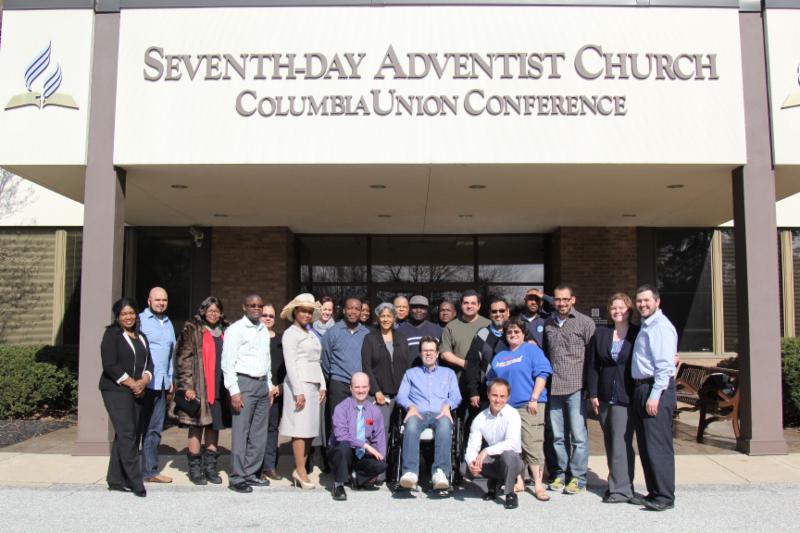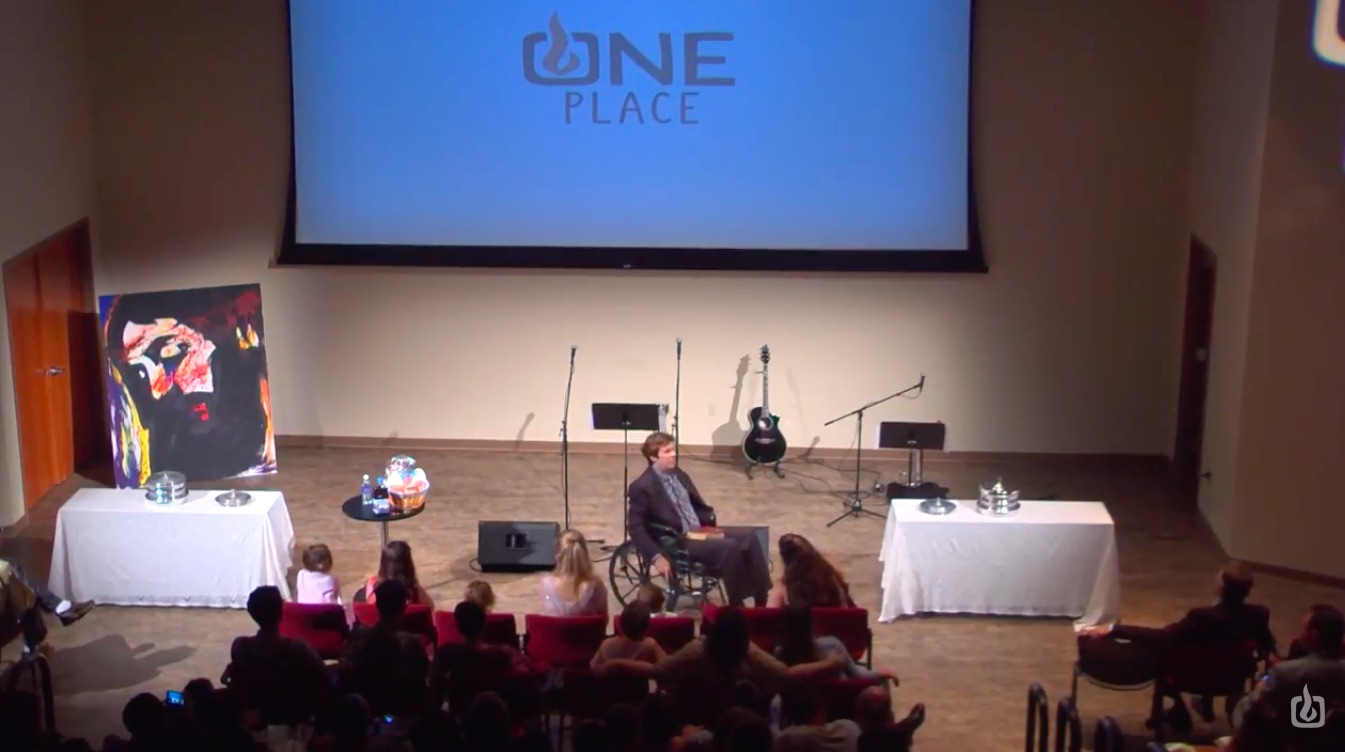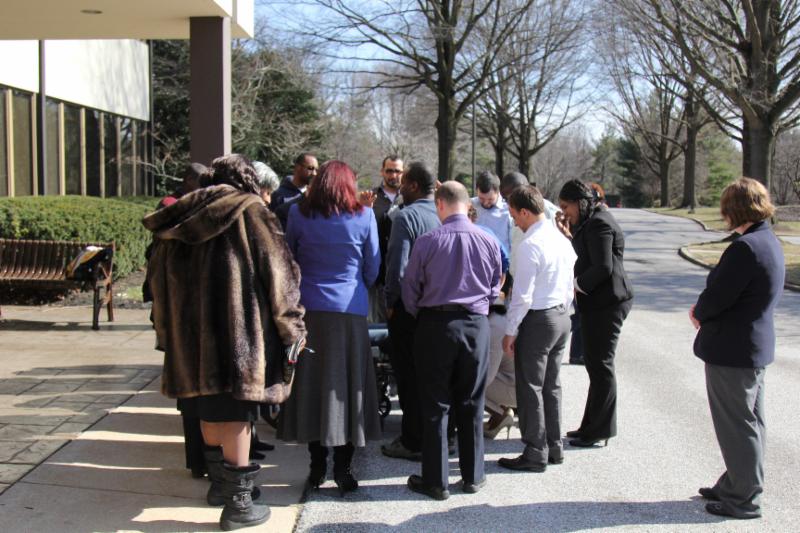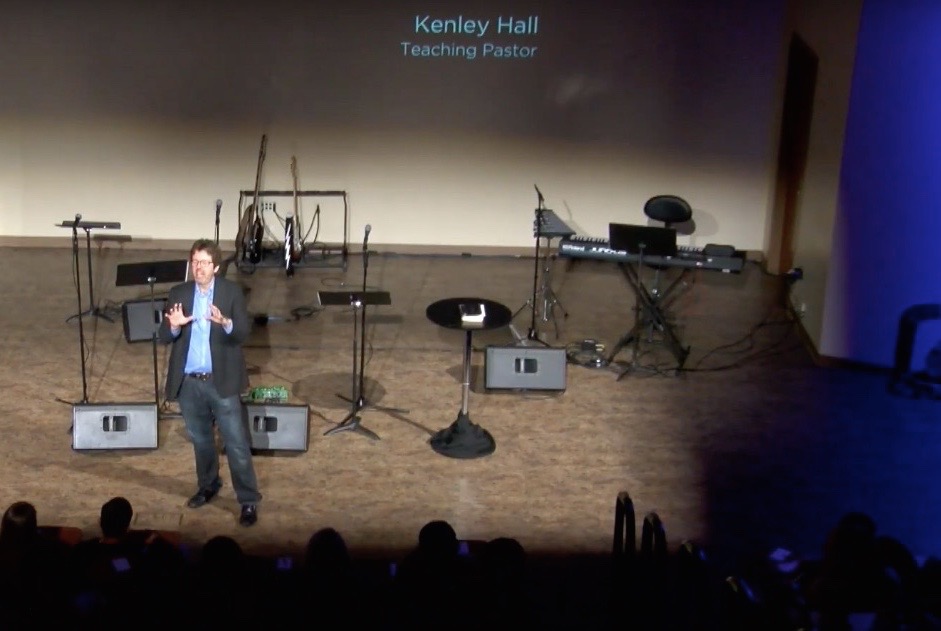This Illness is for the Glory of God
 By: Samantha Angeles Peralta
By: Samantha Angeles Peralta
September 2017
“God, if these students are expecting that, at the end of this prayer, I’m going to jump up out of this wheelchair, please do not let it be destructive to their faith when it doesn’t happen,” beseeched Kenley Hall, associate professor of homiletics, in the privacy of his mind as his students pressed close to him, all boldly praying for his physical healing. “You know I’m at peace with this,” he continued to God. “I am perfectly happy to live life as one of Your wounded warriors.”
More than a year prior to this prayer, Kenley had gone from the vibrant, can’t-stop-moving, powerhouse preacher pacing the stage of One Place Fellowship, the community he co-pastored, to a shadow of himself. Paralyzed from the waist down, he now endured daily seizures as a result of constant, excruciating pain.
War in the Camp
In July 2013, he’d preached at a camp meeting that was so fraught with spiritual warfare that participants saw demonic manifestations attempting to distract them from the worship services.
“I had never seen spiritual warfare of this magnitude since I’d been in ministry,” Kenley said. “We spent that week on our knees because that’s the only thing you can do to overcome spiritual attack. And by God’s grace, He did what He always does against Satan—He prevailed.”
However, in that same week, a virulent strain of stomach flu also struck the camp, and Kenley, along with many others, became violently ill.
“I think it was a continued part of the spiritual warfare that had been going on at camp,” he said.
Downward Spiral
Strangely enough, Kenley’s symptoms did not abate, even after three months back at home in Berrien Springs, Michigan. By September, he had lost over 20 pounds, and, worse, he had started to experience first tingling, then numbness from the waist down. By October, he’d lost complete function of his right leg, and by December, he was completely wheelchair-bound. Years later, doctors’ best guess is that the stomach virus caused a autoimmune reaction in his body that began to eat away at his body’s central nervous system.
“I remember nights when I’d lay in bed and look down at my feet and just will them to move, will my toes to wiggle,” he said. “But it didn’t matter how much I tried—nothing was going to move.”
Devastating as it was, the paralysis was only the beginning.
“I began to experience severe pain,” he said. “Just a light touch anywhere from my feet to my waist would be excruciatingly painful. Because of the nerve damage and severe pain, I began to have what looked like grand mal seizures. I seized uncontrollably. It had nothing to do with my brain, but because I was in so much pain, my body would go into uncontrollable muscle spasms.”
Thus, in 2013, Kenley had to take a complete leave of absence from his Seminary teaching post to receive treatment for his illness. In these months, he’d run through the gauntlet of the stages of grief: denial, anger, bargaining and depression. Many times, Kenley raged against God, asking, “How could You let this happen to me?”
“I am so grateful that I have a God who invites me to come to Him, even when I am angry with Him,” said Kenley. “The one thing He doesn’t want me to do is to turn my back on Him and ignore Him. But my God is so big that I can come to Him and He can absorb my anger. I can shake my fist and question Him, and God allows and invites me to do that!”
The Miracle of Illness
Compounding Kenley’s grief, however, was that this malady was not new to him. In 2005, while he pastored in the Northern California Conference,  Kenley was struck with an illness that paralyzed him from the wast down, forcing him to take a medical leave of absence. Over time, he came to accept that he would be confined to a wheelchair for the rest of his life. Yet one day, he was using a walker to make his way down the hallway of his parents’ home, utilizing his upper body strength to drag his paralyzed legs, when he heard a voice say, “Set aside the walker, and walk.”
Kenley was struck with an illness that paralyzed him from the wast down, forcing him to take a medical leave of absence. Over time, he came to accept that he would be confined to a wheelchair for the rest of his life. Yet one day, he was using a walker to make his way down the hallway of his parents’ home, utilizing his upper body strength to drag his paralyzed legs, when he heard a voice say, “Set aside the walker, and walk.”
“I don’t know if the voice was audible or not, but I put the walker aside and took that first step, expecting to fall on my face,” he said. “But I took one step, then two, then three, then I was walking down the hall!”
The healing was miraculous, in more ways than one. Not only did Kenley receive his mobility back, against medical understanding, but God also used that illness to bring him to the Seminary as a professor.
Upon returning to the pastoral field, there were no pastoral positions open, and the Northern California Conference made an unprecedented decision—the leaders voted to sponsor Kenley, his wife Roshelle, and their three children to go to the Seminary to complete his Doctor of Ministry degree. The conference covered all of their moving expenses, including a dual housing stipend until they were able to sell their house, and a one-year stipend to cover expenses while he was in school. Such sponsorship is rare for doctoral students. Kenley’s move to Michigan led first to a position as the Doctor of Ministry project coach, then to a full-time position in the Church Ministry department as a professor of homiletics, which he began in 2008 immediately following his graduation.
“Without that illness, I’m not here,” Kenley said. “There’s no question in my mind about that. He harnesses illness to bless us.”
The Miracle of Peace
The miraculous healing almost a decade prior made the reoccurrence of the paralysis even more confusing. “But something began to happen as I went through the stages of grief, as people here at the Seminary and all over the world began praying for me and my family,” he said. “This peace just began to settle into the depths of my spirit. And it wasn’t a gift that God just gave to me—He gave it to my wife and kids. It’s the peace Paul talks about, the peace that passes all understanding, because unless you’ve experienced it, you can’t understand it. It’s not a fleeting feeling—it’s a deep, in-your-soul kind of thing that stays.”
God’s deep peace stayed with Kenley as he took his leave of absence from the teaching and pastoring that he loved, unsure if he’d ever be able to return. It stayed with Kenley as he spent months in the hospital, learning how to live life in a wheelchair, re-learning things that most people take for granted, like going to the restroom and getting out of bed. It stayed with him as he had to humbly allow his youngest son, Joshua, to carry him on his back in and out of cars and busses, up and down each flight of stairs, and in and out of the house.
“I still, to this day, don’t have adequate human words to express the peace God gave me,” Kenley says. “It let me say, ‘It’s okay if I spend the rest of my life in a wheelchair, if there’s never another pain-free, seizure-free day in my life. It’s okay, because God still loves me, and God still has a plan for my life.’”
While he was still in the hospital, he called the chair of his department, Stanley Patterson, his colleague, Hyveth Williams, and then-associate dean Cliff Jones to let them know that as soon as he was released, he would return to his teaching post. With prayer and tears, the three agreed that he’d take a half-time load to begin with, and progress from there.
“By the end of January 2014, I was in my wheelchair, teaching two classes,” he said. “By the end of that semester, when everyone saw that the wheelchair did not stop me from teaching, speaking or preaching at One Place, everyone said, ‘It is what it is. Kenley’s moving on, and we can too.’”
Over the next year, Kenley and his family adjusted to his new limitations. God provided blessings along the way, from contractors-turned-Seminary-students who built a wheelchair ramp to his house, to a physical therapist who, as a professor at Andrews University, arranged for free, twice-a-week sessions for Kenley at the physical therapy department as part of his teaching plan in order to reduce Kenley’s copay costs. By early 2015, over a year later, Kenley’s physical therapy had progressed to the point that, along with a walker and braces that could lift his legs, he could stand up from his wheelchair.
 The Gift of Prayer
The Gift of Prayer
In March, Kenley flew to Maryland, where he was scheduled to teach a Master of Arts in Pastoral Ministry (MAPM) intensive course for pastors in the field. Though neither he nor the students were aware, the Sunday through Thursday, 8:00 a.m. to 5:00 p.m. class in homiletics would forever impact their experience with prayer.
“That first Sunday night,” Kenley said, “A lay pastor by the name of Lisa Green showed up to class, saw her professor in a wheelchair, and felt God working on her.”
“I could only say it’s the leading of God,” said Lisa. “When I saw him in the wheelchair, I said to myself, ‘How could a man of God be in a wheelchair? God’s got to do something, and He’s got to do it now!’”
After a classmate confirmed that what she sensed was God's leading, Lisa fasted and prayed for Kenley, without his knowledge, for the rest of the week.
“I believed with all my heart that God would do something,” Lisa said.
When Kenley finished the last teaching session on Thursday night, he prayed a blessing over his students and prepared to send them out.
“They stopped me and said, ‘We always want to give our professors gifts to let them know how much we appreciate them coming and spending this time with us. We thought the best gift we could give you would be the gift of prayer.”
The class gathered around Kenley to pray for him. They had selected Lisa, who had been fasting and praying for Kenley, to lead the prayer, and she knelt and placed her hands on Kenley’s feet and began fervently praying for healing.
“They were just praying and beseeching God to grant me physical healing and restoration,” Kenley said. “And the whole time they’re praying, I’m praying too, in my mind. But my prayer is completely different.”
That’s when Kenley prayed that God would protect his students’ faith if, when they finished, he was not healed. As the students completed their prayer, they looked at Kenley. And still he sat in his wheelchair.
“I could tell they were really expecting something to happen,” Kenley said. “And I’m just thinking, ‘God, we’re cool. But just help them.’ But about a minute after the prayer, I began to feel this tingling sensation in my toes and feet. And the next thing I knew, I was wiggling my toes! I’d spent so many nights laying in bed willing my feet to move and nothing would happen. And now, all of a sudden, I’m wiggling my toes!”
Kenley said to Lisa, “This may sound a little strange, but grab ahold of the end of my shoes and tell me what you feel.”
And she said, “I feel your toes wiggling.”
Kenley responded, “This may not be a big deal to any of the rest of you, but this is huge to me. If all I get is this, it’s great!”
“To this day, I tell people I’m an obsessive toe-wiggler,” Kenley comments.
The class gathered and prayed again, thanking God for the “miracle of the wiggling toes.” Then, the class took Kenley back to his hotel in his wheelchair, and they each said their goodbyes.
“I sat there on my bed watching my wiggling toes, thinking, ‘This is really cool! I can’t believe it!’” Kenley said. “Then I thought, ‘You know what? If my toes are moving, I wonder if anything else is happening.”
“So I pulled off the big, cumbersome leg braces I had on, slid over to the floor, stood up—and next thing I knew, I was just walking back and forth unassisted, unaided, across the floor of my hotel room! Just like that!”
Sharing the News
Thrilled, Kenley began to call his wife to tell her the good news, but, loving a good joke, he decided to surprise her and his son, Joshua, instead. With no other way to transport his wheelchair and leg braces home, the next morning, Kenley put on the braces, got in the wheelchair, and flew back to Michigan, where his wife and son were waiting for him to arrive.
He planned to get up out of the wheelchair in front of them once he was rolled off the plane, but after greeting him, Roshelle quickly said, “Josh is going to take you home. I just came here to meet your plane, but I’ve got to go directly back to work.”
“I’ll go to elaborate means for surprises,” Kenley said. “I allowed Josh to drive me home, wheel me back in the house, and then I just sat there, waiting for my wife to get home. Wouldn’t you know, Roshelle worked overtime that day!”
But when Kenley was finally able to get both Roshelle and Josh in a room with him, he said, “You know, there was something else that happened on the trip, but I thought, what’s the fun in telling you? I thought I’d just show you!”
And for the first time in more than a year, he got up from his wheelchair and began walking around his home.
“The first thing Roshelle noticed were my wiggling toes,” he laughingly remembered. “And then the smiles, the tears, the celebration. As soon as I shared that with my family, I got online with all of my students, saying, ‘I have to let you know—here’s what God did!’ And we rejoiced and celebrated together.”
Lisa, who had fasted and led the prayer for Kenley, said, “I feel honored by God. It did good in me to see that God could use a sinner to be a conduit for healing in His manservant.”
Reflections
“To this day, a lot of the students will tell you that this has impacted their faith and ministry more than anything they’ve experienced,” Kenley said. “It’s just an incredible testimony to the truth of God’s word, that He can take anything and turn it into something good. I don't believe that God was responsible for my illness. However, only God can take something this horrific and turn it into something incredibly good and beneficial, not only to further my growth, but also to further the growth of so many around me.”
“I don’t think God did the miracle of the physical healing for me at all,” Kenley continued. “I was in complete acceptance. I didn’t need it. I think God did it for the people here at the Seminary who were praying for me. For the group of MAPM students—I think He did it for them. I am grateful! But I believe God really did it to give them that experience.”
“But the other thing that I always want to say at the end of this too,” Kenley emphasized, “Is that for me, the physical healing, though I am deeply grateful for it, is not the greatest miracle that God performed. For me, the greatest miracle was when God gave me peace in the midst of the storm.”
“I know that there are people of greater faith than I that still sit in their wheelchairs and have not experienced the physical healing that I have," Kenley said. I would never want to suggest that my experience with healing is normative for people’s experience with illness. But I do know that the experience that God gave me of peace is something that everyone could have. And I still believe today, that by the grace of God, were we doing this interview with me still sitting in my wheelchair, I would still be praising Him because of the miracle of the peace that He gave me.”

